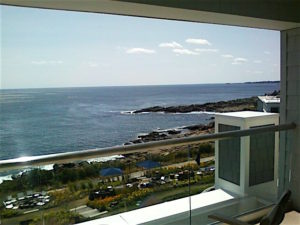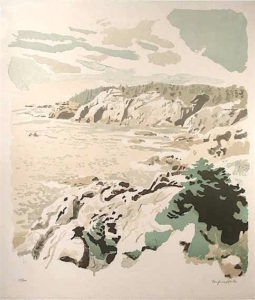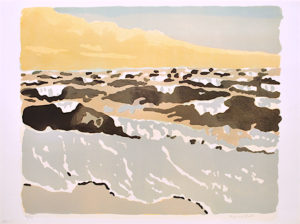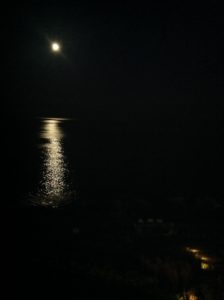 Not the least of the many ways in which my life has changed in the course of the past quarter-century is that I now spend as much of it as I can by the sea, which is where Mrs. T and I are today. We drove up to Maine on Saturday to see a show, the Ogunquit Playhouse’s revival of Ragtime, and we’re staying, as we always do when we go to Ogunquit, at Cliff House Resort, a hotel perched on the edge of Bald Head Cliff, which overlooks the Atlantic Ocean. Originally built in 1872, Cliff House started life as a family hotel. It was still a bit on the shabby-genteel side when we first stayed there—that was part of its charm—but has since been transformed by gradual installments into a fully up-to-date resort, albeit one whose windows look out on seascapes that Winslow Homer could easily have painted a century ago.
Not the least of the many ways in which my life has changed in the course of the past quarter-century is that I now spend as much of it as I can by the sea, which is where Mrs. T and I are today. We drove up to Maine on Saturday to see a show, the Ogunquit Playhouse’s revival of Ragtime, and we’re staying, as we always do when we go to Ogunquit, at Cliff House Resort, a hotel perched on the edge of Bald Head Cliff, which overlooks the Atlantic Ocean. Originally built in 1872, Cliff House started life as a family hotel. It was still a bit on the shabby-genteel side when we first stayed there—that was part of its charm—but has since been transformed by gradual installments into a fully up-to-date resort, albeit one whose windows look out on seascapes that Winslow Homer could easily have painted a century ago.
 In 2003 I visited Maine for the first time and fell in love on the spot with its myriad natural beauties, above all the turbulent, forbiddingly rocky coastline that was unlike anything I had ever seen or imagined. Soon thereafter, I started seeking out professional and personal opportunities to be beside the seaside, in Maine and elsewhere, and have been doing so ever since. As I wrote in this space in 2005 after my first trip to the Jersey Shore:
In 2003 I visited Maine for the first time and fell in love on the spot with its myriad natural beauties, above all the turbulent, forbiddingly rocky coastline that was unlike anything I had ever seen or imagined. Soon thereafter, I started seeking out professional and personal opportunities to be beside the seaside, in Maine and elsewhere, and have been doing so ever since. As I wrote in this space in 2005 after my first trip to the Jersey Shore:
Coming as I do from the middle of America, I find at the age of forty-nine that I can count on the fingers of both hands the number of nights I’ve slept by an ocean. Like everyone who falls in love with the sea in adulthood, I’m incapable of saying anything about it that hasn’t been said a million times before: its ever-changing, self-renewing presence instantly reduces me to clichés. As I sat on the boardwalk and watched the waves that my beloved Fairfield Porter painted so well, I could do no better than to recall the words of Jean de la Ville de Mirmont that Gabriel Fauré set to music with such exquisitely apposite simplicity in L’horizon chimérique, the most perfect of all his song cycles: The sea is infinite and my dreams are wild.
 Five months later I met Mrs. T, a New England girl who had spent many a youthful summer on the beaches of Connecticut, and five years after that the two of us went to Florida’s Sanibel Island for the first time. Since then we’ve returned to Sanibel every winter and visited Maine nearly every summer, irresistibly lured by the sea, about which I still have nothing even slightly original to say. I take comfort for this abject incapacity in a remark that Dave Tough, the great jazz drummer, made to his friend and colleague Bud Freeman when they went to the Art Institute of Chicago in 1922 to look at a still life by Cézanne. “I wish I could say something about this magnificent work,” Freeman told Tough, who replied, “That’s the best thing you’ll ever say about it.”
Five months later I met Mrs. T, a New England girl who had spent many a youthful summer on the beaches of Connecticut, and five years after that the two of us went to Florida’s Sanibel Island for the first time. Since then we’ve returned to Sanibel every winter and visited Maine nearly every summer, irresistibly lured by the sea, about which I still have nothing even slightly original to say. I take comfort for this abject incapacity in a remark that Dave Tough, the great jazz drummer, made to his friend and colleague Bud Freeman when they went to the Art Institute of Chicago in 1922 to look at a still life by Cézanne. “I wish I could say something about this magnificent work,” Freeman told Tough, who replied, “That’s the best thing you’ll ever say about it.”
Part of what I love about the sea is the fact that it is not merely a visual phenomenon but an auditory one as well, making it accessible to those musicians who are, like me, seduced by the sound that it gives off, sometimes gently susurrating and sometimes overwhelming in its random splendor. Even so, I suspect that it is the painter’s art that has been most powerfully shaped by proximity to the ocean, and as much as I delight in listening to the crash of the surf, it is the sight of the unstill sea that fills me with something not far removed from ecstasy.
One of the things that keeps me coming back to Cliff House is its outdoor hot tub, which is close to the edge of Bald Head Cliff. I sat in the tub for a half hour after dinner last night and gazed at the full moon, which shone down so brightly on the Atlantic that no stars were visible, only the endlessly blinking beam of a lighthouse far in the distance.
 By then Mrs. T had returned to our room to escape the chill of the night air, but I found it impossible to look away from the white golden glow of the moon and the rippling surface of the ocean far below. All at once a sentence by W.H. Auden popped into my mind: Looking up at the stars, I know quite well/That, for all they care, I can go to hell. Bemused by the thought of the coolly indifferent moon that will be shining down on Bald Head Cliff long after I and everyone I know have crumbled into dust, I clambered out of the hot tub, dried myself off, and went up to the room, where Mrs. T greeted me with a broad smile.
By then Mrs. T had returned to our room to escape the chill of the night air, but I found it impossible to look away from the white golden glow of the moon and the rippling surface of the ocean far below. All at once a sentence by W.H. Auden popped into my mind: Looking up at the stars, I know quite well/That, for all they care, I can go to hell. Bemused by the thought of the coolly indifferent moon that will be shining down on Bald Head Cliff long after I and everyone I know have crumbled into dust, I clambered out of the hot tub, dried myself off, and went up to the room, where Mrs. T greeted me with a broad smile.
“Look!” she said proudly as she held up her iPad, on whose screen I saw a photo of the full moon at which I had been gazing minutes before. “I got a pretty good picture, didn’t I?”
“You sure did, my darling,” I replied, turning away for a moment to dry my eyes. “You sure did.”
* * *
Gérard Souzay and Jacqueline Bonneau perform Gabriel Fauré’s “La mer ist infinie,” from L’horizon chimérique, composed in 1921:
Richard Hickox and BBC National Orchestra of Wales perform “Moonlight,” a movement from The Sea, composed in 1911 by Frank Bridge, Benjamin Britten’s composition teacher:
Benjamin Britten and the Royal Opera House Orchestra perform the “Moonlight” interlude from Britten’s Peter Grimes, composed in 1945:

